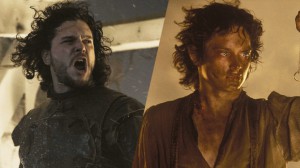 Similarities and differences. Or as Tolkien might have put it, bones and soup. It’s the never-ending, never truly answerable question of who owes whom what.
Similarities and differences. Or as Tolkien might have put it, bones and soup. It’s the never-ending, never truly answerable question of who owes whom what.
In this recent article on the BBC, Jane Ciabattari examined how The Lord of the Rings has influenced the creator of A Song of Ice and Fire, George RR Martin.
Fair enough.
However, the first sentence left me kinda wanting to throw things.
Why can’t fantasy authors escape from Tolkien’s shadow?
Bless him (because I love Middle-earth to bits), Tolkien remains the undisputed giant of Epic (or High) Fantasy and a key influence there. But fantasy is a far broader church, and Tolkien’s influence is less dominant on its other sub-genres.
Robert E Howard (Conan) and Fritz Leiber (Fafhrd and the Grey Mouser) set the standard for Heroic Fantasy even as Tolkien was completing The Hobbit. Dark Fantasy’s roots lie with Gertrude Barrows Bennett — who wrote under the pen name Francis Stevens during and after WWI, while the pinnacle of Gothic Fantasy must remain Mervyn Peake’s magnum opus, Gormenghast. Urban Fantasy is lately dominated by Jim Butcher (though I concede Harry Dresden’s wizardly descent from Gandalf).
Science Fantasy has been going its own way for decades: Marion Zimmer Bradley’s inventive melding of psi-powers, other worlds and science, Jack Vance’s post-apocalyptic Dying Earth series and Gene Wolfe’s The Book of the New Sun with its unreliable narrator each stand as classics in their own right. Of course, Zimmer Bradley also authored The Mists of Avalon, a renowned inversion of Arthurian legend that brings the story of Morgan le Fey to fore and is regarded as “a watershed for feminist interpretation of male-centered myth”.
My point is that if fantasy authors can’t seem to escape Tolkien’s shadow, it’s not because they’re stuck in Tolkien’s sandpit and unwilling, or unable, to venture outside those limits. Because clearly they are not.
Instead, it is because media organisations like to present it that way. It’s a convenient narrative that panders nicely to people’s expectations. It makes for easily written colour features that require a minimum of research. And because the media keeps saying it, people believe it must be true.
It’s unhealthily self-reinforcing.
This is a real disservice to the rich diversity and talent of fantasy authors both living and dead — denying recognition of their innovative ideas, and the chance to be thought of as anything other than a knock-off.
It also provides succour to the sniffy disdain of some of the literary elite who deride fantasy as a barren intellectual wasteland full of talentless hacks who can’t do anything except poorly regurgitate Tolkien’s ideas. That’s the selfsame people who look down on fantasy readers as wooly-headed time-wasters. Here’s one recent example of genre-shaming of Young Adult fiction if you’re unconvinced it actually still occurs. I love my Tolstoy nearly as much as my Tolkien, but I just can’t wrap my head around this attitude.
So let’s celebrate Tolkien, but let’s also recognise and tell folks that fantasy is much more than that — and has been for a long time. Because then we might finally all be able to get out of the SF ghetto.
Demosthenes has been an incredibly nerdy staff member at TheOneRing.net since 2001. The views in this article are his own, and do not necessarily represent those of other TORn staff.


